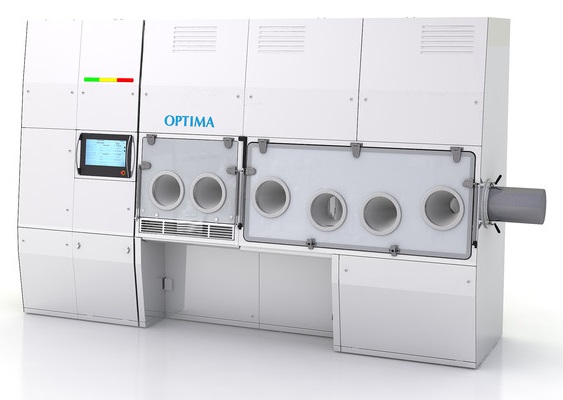Optima Pharma and Charité – Universitätsmedizin Berlin are developing a concept for the automated production and filling of cell and gene therapeutics.
These new types of medications are considered a promising new therapy opportunity for incurable cancer and metabolic diseases. They also pave the way for personalized medication. These medications depend on the patient’s cells. They are still produced manually, for each individual patient, which is very expensive. The innovative project is financed by the Berlin Institute of Health (BIH).
“A new era is starting in the treatment of serious cancer diseases and gene defects,” says Professor Dr. Lars Bullinger, Director of the Medical Clinic, with the focus on hematology, oncology, and tumor immunology at the campus Virchow-Clinic of Charité. “In the future, cell and gene therapy will provide important contributions for the treatment of, so far, incurable diseases,” Bullinger is convinced. The registration of the new blood cancer medications, Kymriah® and Yescarta®, in the European Union is evidence. The increasing demand for personalized cell and gene therapeutics requires the automation of the manufacturing process, according to Bullinger. The individual manufacturing process is too time consuming, costly and the quality of the therapeutics suffers.
Process knowledge from Charité, technical expertise from OPTIMA pharma, financing by BIH
For these reasons, Optima Pharma is working together with Charité on a production platform that will allow the manufacturing of personalized medication in an automated process while meeting the high standards of the pharmaceutical industry. The production platform offers the possibility to map the necessary processes required to manufacture different cell and gene therapy products. Charité has the applicable knowledge in producing these therapeutics. “Optima Pharma contributes the necessary expertise in the process technology and automation,” adds Dr. Andrea Traube, Director Market Development Pharma at Optima Pharma. The BIH finances the innovation partnership. The project is also supported by the expertise of the Berlin Health Innovations, the joint technology transfer of the BIH and Charité. The objective is to speed up the process of clinical projects like this one and bring them to a faster and a more promising successful application. After an internal development process and construction activities at Charité, the machine will be installed, validated, and the corresponding production permit will be requested.
Automation and strict separation of operator and product improve process safety
Due to the automation of manual processes and the associated reduction of human interference, the strict separation of product and operator and the exact recording and documentation of all process steps, the risk of loss of the individual patient’s product is significantly minimized. The automated production platform increases process safety and minimizes the risk for patients. Besides Charité, large clinics, research institutes, pharmaceutical contract manufacturers, laboratories, start-up companies, and large pharmaceutical companies could also be the users of this machine solution. According to Andrea Traube, there is a tremendous demand for automated production platforms for cell and gene therapeutics.
Cell and gene therapeutics are the so-called “Advanced Therapy Medicinal Products”. They open up new ways for the treatment of diseases. As opposed to conventional medications, cell and gene therapeutics are created individually for each patient and the therapy starts with the causes and not the symptoms. Within the gene therapy, cells from the patient are taken, genetically modified, and administered again. Cells are also taken from the patient for cell therapy. The difference to gene therapy is the stimulation of active endogenous ingredients and reactions.
About OPTIMA pharma
Optima Pharma develops and manufactures filling, closing and process technology for pharmaceuticals. Highly sophisticated, fully automated systems from Optima Pharma are used to process blood plasma products, vaccines, oncology and biotech products in prefilled syringes, vials, bottles and cartridges. Non-sterile pharmaceuticals and diagnostics are further applications. The company’s extensive technology portfolio includes washing machines, sterilization tunnels, filling and sealing, robotic product handling and other functions. Freeze drying systems and isolator technology are part of turnkey systems by Optima Pharma. The product range comprises machinery for laboratory filling up to high-speed systems. The division guarantees quick, professional service with 14 international locations. Optima Pharma is a member of the OPTIMA packaging group GmbH (Schwäbisch Hall), which employs a workforce of more than 2,400 around the globe.
About Charité – Universitätsmedizin Berlin
Charité – Universitätsmedizin Berlin is one of the largest medical universities in Europe with approximately 100 clinics and institutes, and four locations, as well as 3,001 beds. In 2018, 152,693 stationary and portable cases, as well as 692,920 outpatients were treated. Charité closely interlinks research, training, and patient treatment. Across the group, the university clinic of Berlin employs about 18,000 employees and is one of the largest employers in Berlin. Approximately 4,536 are employed in the care sector and 4,357 work in the science and medical field. In 2018, Charité had a total revenue of approximately 1.8 billion Euro. With more than 170.9 million Euro in external funding, Charité created a new record. About 7,500 physicians and dental specialists are trained at the largest medical facility in Germany. Furthermore, 619 apprentice spots are available in nine medical fields.
About the Berlin Institute for Medical Research/Berlin Institute of Health (BIH)
The Berlin Institute for Medical Research | Berlin Institute of Health (BIH) is a scientific institution for translational and precision medical science. The BIH pursues new approaches for better prognoses and innovative therapies for progressive diseases to return and provide quality of life to patients. Translational research and innovation prepared for BIH for a utilization personalized healthcare provision. The BIH is to 90% promoted by the Federal Research Ministry (BMBF) and to 10% by the Senate Administration Berlin. The founding institutes, Charité – Universitätsmedizin Berlin and the Max-Delbrück-Center for molecular medicine in the Helmholtz Association (MDC), are independent institutions in the BIH.




















